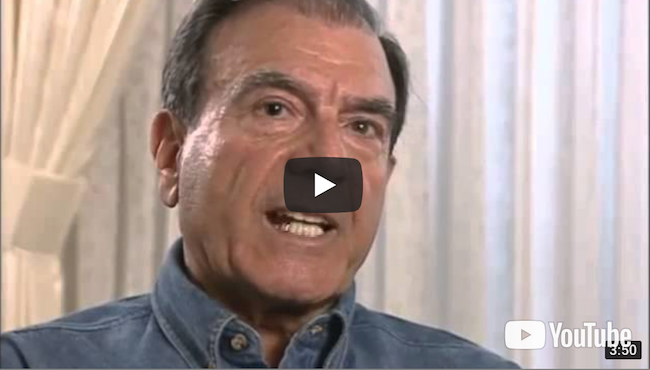
Holocaust Survivor Dario Gabbai Tells His Story
Originally shared on USC Shoah Foundation.
Dario Gabbai is one of many Holocaust survivors, but one of just a handful still alive who experienced working in the Sonderkommandos — work units of prisoners forced to aid in the gassing and disposal of Jews.
Gabbai, the middle of three brothers, was born in Salonika, Greece, in 1922 to a family of Italian Jews. His early life was full of happiness and learning. He attended an Italian school where he learned four languages, played clarinet in the school band, went fishing with his father, and spent his summers exploring Italy on school trips. He planned on attending Italian university to become a doctor until dictator Benito Mussolini outlawed it in 1938.
Because Italy and Greece were at war, Gabbai was caught between his two countries as early as 1941. His family, along with other Italian Jews, was forced to relocate to a camp and then a hotel. They were not allowed to work or attend school while the fighting persisted. In 1943, the Italian government moved them to Athens, where Gabbai resumed attending school and sold things on the black market to help make ends meet for his family, as his parents were not working.
During this time, Gabbai’s family and other Jews had to present themselves weekly at a local synagogue so the Germans could keep tabs on them. In March 1944, without warning, German soldiers surrounded the Jews in the synagogue and transported them first to the Haidari concentration camp in Greece and then, after about a week, to Auschwitz-Birkenau in Poland.
Upon arrival, Josef Mengele made his infamous selection, choosing just around 10 percent to live and sending the rest of the arrivals, including Gabbai’s parents and younger brother, to the gas chambers. Gabbai and his older brother were chosen to be part of the approximately 1,000 prisoners in the Sonderkommando. After the Nazis killed arrivals in the gas chambers, the Sonderkommando would come in, cut the hair of the deceased, burn their bodies, and clean out the chamber for the next round of arrivals. To get through it, Gabbai said he attempted to function like a robot rather than a human being. He vowed to live in order to spread the word of the Nazis’ Final Solution.
However, in order to keep the Final Solution secret, the Nazis would kill members of the Sonderkommando about every six months and bring in new recruits, and Gabbai worked under the assumption that he would soon be dead himself. Instead, as the Germans began losing the war, they abandoned Auschwitz-Birkenau and marched the survivors through Austria. Gabbai said the weather was 23 degrees below zero, but he survived from mental willpower by imagining he was in sunny Athens. Anyone who could not keep up was killed by SS officers.
From then on, Gabbai was shuttled between camps: First he went to Mauthausen, then to Melk, and finally to Ebensee. At all these stops, he was careful never to mention he was part of the Sonderkommandos, as he would have been killed. One morning, in May 1945, Gabbai woke up to find Germans had left Ebensee. A few hours later, American soldiers rolled in.
Gabbai spent a month and a half working with the United Nations, and then returned to Greece, where he was eventually reunited with his brother and sister-in-law. In 1951, he was sponsored by a Jewish community in Cleveland to come to the United States. Shortly after, he moved to California, where he was cast in a Hollywood film, but then left to work in business. He married and had one daughter. Now retired, Gabbai shares his story as one of the few members of the Sonderkommandos still alive today.